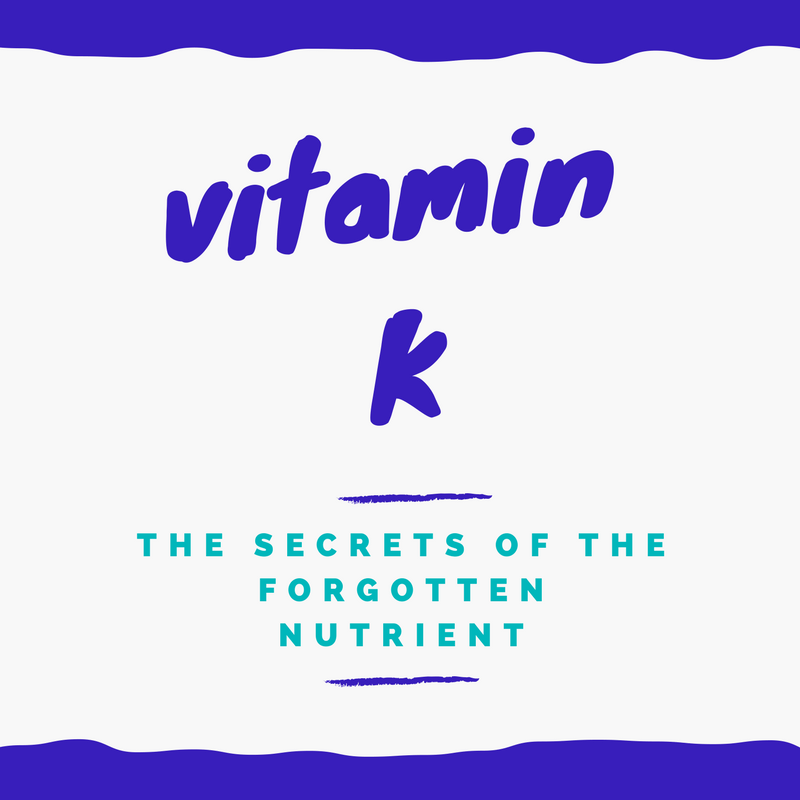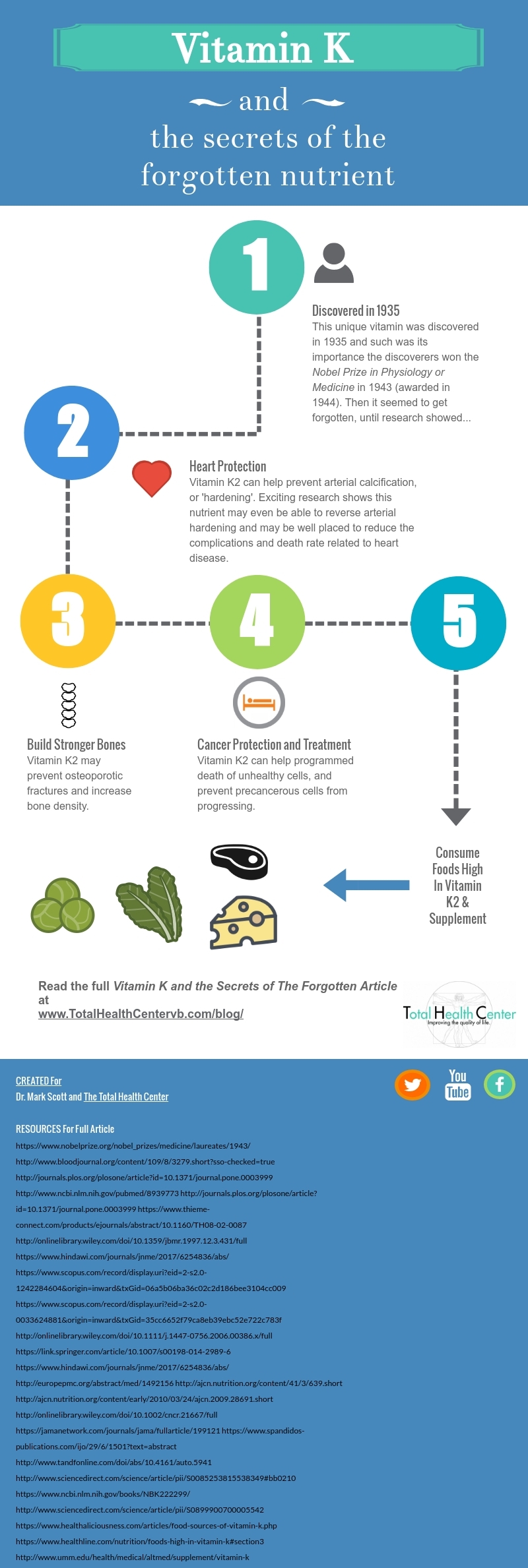
Vitamin K… Have you heard of this potent health improving nutrient? Chances are you may not have.
While research into vitamin K has expanded over the last eight decades since its discovery in 1935, leading to a greater understanding of the importance of this nutrient and insights into the variety of effects it has in our bodies, it is still little known.
In fact, such was the importance of the discovery of this vital vitamin that The Nobel Prize in Physiology or Medicine was shared in 1943 (awarded in 1944) between Henrik Carl Peter Dam “for his discovery of vitamin K” and Edward Adelbert Doisy “for his discovery of the chemical nature of vitamin K”.
Not bad!
Let’s first take a look at the discovery of vitamin K – I always find it interesting how life changing events come to light — and then discuss how this profoundly positive nutrient could enhance, even save, your life.
The Discovery of Vitamin K
In his Nobel Lecture, The discovery of vitamin K, its biological functions and therapeutical application, Dam talked about the discovery of vitamin K in relation to studies on cholesterol metabolism in chicks. Other researchers had been studying whether young chickens could create cholesterol, concluding that chicks were unable to thrive on a sterol-deficient diet. Dam repeated these experiments, with several variations, and his results guided him to new and curious questions.
He noted an unexpected and significant symptom arose after longer periods without consumption of dietary cholesterol. These baby chickens couldn’t clot their blood in a healthy way and so suffered from bleeding under their skin and into their muscles and organs. Dam declared the existence of an unrecognized fat-soluble factor in the diet, which was confirmed one year later.
Characterized as a new vitamin, it was given the name ‘K’ because this letter simply had not been taken and due to the Scandinavian and German spelling of the word so key in its effects and discovery, “koagulation”.
We now know that this fat soluble vitamin is stored in the body’s fatty tissues and the liver, and its importance stretches far beyond blood clotting (coagulation) and into other critical areas of our health.
Vitamin K – The Critical Forgotten Vitamin
As vitamin K stretches its profound effects into various areas of our health, this forgotten vitamin brings health benefits to our skeletal, cardiovascular and digestive systems and in the treatment of osteoporosis and cancer, the reversal of arterial calcification and in protection from heart disease.
This often undiscussed nutrient packs a significant punch in deficiency, and its supplementation can be a health game changer. We’ll get to this important information soon, but first let’s look at the forms of vitamin K, how vitamin K works, the role it plays in various aspects of your health. We’ll look at foods that are naturally high in this vitamin, and how to ensure a sufficient intake to help ward off major health challenges whilst improving your wellbeing.

The 3 Forms of Vitamin K
Vitamin K exists in three different forms, each with its own chemical structures and properties. These are:
K1, also known as phylloquinone (the plant form of vitamin K)
K2, known as menaquinone (the bacterial form of vitamin K)
K3, called menadione (a synthetic variant of vitamin K)
Vitamin K1 is produced in large quantities by green leafy vegetables like spinach and kale, and is a key component of healthy blood clotting (coagulation) in humans. K1 helps the body to clot our blood, when needed, like when we get a cut or suffer from a bruise. K1 is also important because it can be converted into K2 by our gut bugs (microbiome).
Vitamin K2 is needed to produce strong bones. A deficiency in vitamin K2 can lead to less calcium being absorbed and weaken our bones as a result. Despite both vitamin K and K3 playing a role in bone health, it is vitamin K2 that’s the super star in forming stronger bones.
Vitamin K3 is, in essence, a pro-vitamin. What this means is, it is a synthetic — or an artificial — compound that humans can break down and convert into K2. It is sometimes used as a nutritional supplement.
How Vitamin K and Vitamin D Work Together
When discussing vitamin K2 and its metabolism, it is important to also consider vitamin D3 and the way they work together in harmony to promote optimal bone strength. Vitamin D3 promotes absorption of calcium from the digestive system and vitamin K2 then enables this calcium to build better bones. Studies have shown that vitamin K2 and D3 work together more effectively than either vitamin on its own.
Besides vitamin D and vitamin K’s tandem effects on bone formation, they are also wonderful for our heart health and cardiovascular system. Vitamins D and K help to prevent our arteries from calcifying and hardening, and as hardened arteries are a main cause of cardiovascular disease and cardio-embolic stroke, these nutrients are important in protecting our body and mind.
This Simple Nutrient Can Protect Your Heart Health
Vitamin K2 can help prevent arterial calcification; as we mentioned above, this is also called hardening of the arteries. When arteries become hard, they lose their flexibility and the space for carrying oxygen-containing blood around the body is reduced.
Think of your arteries like the end of a toothpaste tube and your blood like the paste. When the tube is brand spanking new, the paste clears the opening with ease. However, toward the end of its use if you haven’t kept it clean, you have to push harder to move the paste through the clogged, craggy and stiff end.
You want to keep that tube working like new!
Excitingly, some studies have shown that vitamin K2 may actually reverse arterial hardening and that we can restore the elastic properties of vessel walls through supplementation. “By reducing vascular calcification,” K2 may be well placed to reduce the complications and death rates caused by cardiovascular ill health.

Vitamin K Builds Stronger Bones
Vitamin K, as mentioned above, has also been shown to play important roles in bone health. Specifically, vitamin K2 prevents fractures from osteoporosis. It has been shown to maintain the strength of the bones in the lower back (lumbar bone mineral density) in this common condition. In fact, vitamin K2 may play a significant role in the improvement of spinal bone strength (bone mineral density (BMD)) and prevent fractures in osteoporotic postmenopausal women.
In one study, postmenopausal women with osteoporosis were treated with 45 mg vitamin K2 and 1500 mg calcium daily for 48 weeks, and experienced a significant increase in lumbar BMD. In this way, many researchers believe vitamin K2 can act alongside vitamin D and oral calcium supplementation to treat osteoporosis with less side effects than traditional medications.
That’s great news!
The ‘K’ Key To Digestive Health
Vitamin K plays an increasingly understood role in gastrointestinal health. Inside our digestive systems live billions of bacterial, viral and fungi, known as our digestive microbiome. These ‘bugs’ support normal, healthy function and are critical to our wellbeing. The bacteria in the human gut is the principal way fermented foods are turned into active vitamin K2. These gut-made active forms of K2 can provide the lion’s share of human vitamin K daily requirements.
And from maintaining health, let’s take an exciting look at the possibilities of treating traditionally difficult to manage gut conditions…
Suffer From Ulcerative Colitis or Crohn’s Disease? There Is Hope!
In more extreme forms of gastrointestinal disease, like the inflammatory bowel conditions of Ulcerative Colitis or Crohn’s disease, absorption of fat-soluble vitamins like A, D, E, and importantly K, can be reduced due to the chronic inflammation, tissue damage, and painful abscess formation that afflicts the digestive tract.
Because of this, people with poorly treated inflammatory bowel conditions oftentimes suffer from drastic vitamin K deficiencies. This can manifest as recurring blood clotting disorders. Because of the strong association between chronic digestive diseases, like ulcerative colitis and Chron’s disease, and vitamin K deficiency, new studies are looking at re-populating (have you heard about poo transplants? These are incredible) healthy microbiota in conjunction with anti-inflammatory approaches, to treat the vitamin K2 deficiencies from which Crohn’s and Ulcerative Colitis patients suffer.

The Big C – Cancer Protection and Treatment
With cancer being one of the most terrifying types of illness and a leading cause of death, the effects of vitamin K as a possible protective nutrient also able to treat the big ‘C’ is exciting!
Let’s take a look…
Liver Cancer
Vitamin K has been shown to help the liver in a number of ways. For instance, a pilot study in 2006 looked at vitamin K2 supplementation in patients with a certain type of liver cancer, hepatocellular carcinoma, after curative treatment. Disease recurrence and survival was observed and it was found that vitamin K2 “may have a suppressive effect on recurrence of hepatocellular carcinoma.” This nutrient could actually reduce the risk of this cancer returning!
We know that viral cirrhosis — a chronic disease of the liver — increases the risk of developing liver cancer (hepatocellular carcinoma). In a 2004 JAMA study, vitamin K demonstrated a possible role “in the prevention of hepatocellular carcinoma in women with viral cirrhosis.” Imagine, this nutrient could possibly stop this cancer developing!
How can vitamin K do this?
A normal cell has an in-build self-destruction button, which plays an important protective role if damage occurs. Press! Unhealthy cell growth stopped. Cancer cells often achieve their cell immortality by blocking this ability. A 2006 study suggested that vitamin K2 possibly induced appropriate cell death, stopping wayward cells from becoming undifferentiated and immortal, aka dangerous.
Leukemia
This same vitamin K2-induced induction of cell death in cancerous cells has even been observed in certain types of leukemias. A 2008 study demonstrated that pre-cancerous leukemia cells could be killed by high concentrations of vitamin K2, possibly halting cancer progression.
Prostate Cancer
With prostate cancer directly affecting more than three million men in the USA, and killing tens of thousands of men each year, it is a cancer in need of better answers and treatments. Studies of patients with high vitamin K intake showed a decreased incidence of prostate cancer when the principal vitamin was vitamin K2. Now, that’s promising!
Fermented Cheese… A Potent Cancer Preventer?
Vitamin K’s relationship to the incidence and progression of cancers is a focus of intense scrutiny in nutritional studies, with promising results. Dietary intake of vitamin K2, especially in the consumed form of fermented cheese, showed incredible promise “associated with reduced risk of incident and fatal cancer.”
What Can Happen When Your Vitamin K Levels Are Low?
There are a number of different reasons why your vitamin K levels may be low, and the situation is common enough that vitamin K is sometimes called “the forgotten vitamin.”
When discussing vitamin K it is important to remember how it is absorbed into the human body. Vitamin K, along with A, D, and E, are fat-soluble vitamins, meaning they need healthy fats (lipid-dependent mechanism) to be successfully taken into the bloodstream. Because of this, diets that restrict fats can also lower the amount of Vitamin K that can be absorbed. Similarly, conditions that waste fat in humans, such as extreme weight loss diets, extreme physical training, or weight-wasting conditions, greatly reduce fat stores in the body and jeopardize adequate vitamin K absorption. Given how important healthy fats are, this isn’t surprising.
Certain medications can also reduce vitamin K uptake. Broad-spectrum antibiotics, cholesterol-stabilizing drugs, and sometimes even aspirin may all lower vitamin K absorption. To further complicate the situation, certain drugs acting together may block vitamin K uptake too.
Finally, poor gut function, surgical pathology, or gastrointestinal disease, like we’ve already talked about, will reduce the amount of vitamin K that can be absorbed from food and supplemental sources.
Are There Any Side Effects in K2 Supplementation?
Because of the positive effects of vitamin K, and the possible commonness of deficiency, research has also focused on possible adverse effects that may exist with K2 supplementation. A 2009 study in Kidney International studied chronic kidney disease patients and vitamin K deficiency. In this illness, lower vitamin K levels and hardening of the arteries are common. The study supplemented patients with vitamin K2, and based on their results, they stated that, “With regard to the safety of vitamin K2 supplements, no relevant side effects have been described so far.”
The Ins and Outs of Vitamin K Supplementation
As we can see, vitamin K may improve health and reduce the development and consequences of serious illness. Supplementation with K has been shown to be efficient, beneficial and without significant side effects.
With vitamin K often ill considered, low fat diets all but ubiquitous and the illness that this deficiency creates so common, supplementation offers a wonderful way to raise vitamin K levels.
But can we absorb it?
The ability of a substance to enter our bodies and have an effect on our biology — its bioavailability — may actually be higher in supplemental form. While improving food intake and maximizing a healthy lifestyle are both critical, especially the health of the gut when it comes to vitamin K, certain foods may have a low bioavailability, for example, spinach and broccoli.
Vitamin K is critical
One study showed that blood clotting diseases occurred during periods where dietary vitamin K was reduced or absent, and with the knowledge that this vitamin is so critical and a deficiency so harmful, it’s important to ensure an optimal intake.
Supplementation may be a cost effective and important way to increase the bioavailability of this nutrient, improve health holistically and protect against the development of future illnesses.
Which Foods Are High in Vitamin K?
According to the Institute of Medicine (US) Panel on Micronutrients, the adequate intake (AI) for men is 120 and for women 90 μg/day, respectively.
How can you ensure you are consuming enough?
Here is a list of foods high in vitamin K:
Natto is a Japanese fermented soybean food high in vitamin K2. Masao Kaneki MD and his research team discovered a “significant inverse correlation… between incidence of hip fractures in women and natto consumption” indicating a higher K2 level likely contributed to the lower fracture risk. This ancient, exotic, Japanese food might be worth adding to your food plan.
Dried basil is a rich source of vitamin K, with 1 tsp (1 gram) containing 17.2μg. This culinary herb can spice up countless healthy and delicious foods. Need inspiration? Cookpad has create this page dedicated to over 1500 dried basil recipes.
Green leafy vegetables like kale, mustard greens, collards and Swiss chard are rich sources of vitamin K, with 1/2 cup of kale including 531.1μgm.
Brassica vegetables, such as Brussels sprouts, cabbage and pak choi are also vitamin K rich, with an individual sprout offering 29.5μg.
Soy beans and edamame (roasted soy beans) are a wonderful snack or dietary addition and include 33.2μg per half cup.
Some animal products also offer vitamin K, including beef liver, pork chops, chicken and goose liver pate.
Dairy products contain lower amounts of this nutrient, yet both hard and soft cheeses, edam and Jarlsberg help to increase your intake.
Note: According to the University of Maryland Medical Center, vitamin K may be destroyed by freezing, but is not affect by heating.
The Wrap Up
With sufficient levels of vitamin K being critical to health and wellbeing, and its deficiency under-appreciated and potentially catastrophic, this vitamin must enter the consciousness of the majority. The benefits for our skeletal, cardiovascular and digestive systems, and the safer and effective treatment of osteoporosis, certain cancers, and one of the biggest killers in heart disease, vitamin K needs to be correctly assessed for and any deficiency promptly addressed.
Resources
- https://www.nobelprize.org/nobel_prizes/medicine/laureates/1943/
- http://www.bloodjournal.org/content/109/8/3279.short?sso-checked=true
- http://journals.plos.org/plosone/article?id=10.1371/journal.pone.0003999
- http://www.ncbi.nlm.nih.gov/pubmed/8939773
- http://journals.plos.org/plosone/article?id=10.1371/journal.pone.0003999
- https://www.thieme-connect.com/products/ejournals/abstract/10.1160/TH08-02-0087
- http://onlinelibrary.wiley.com/doi/10.1359/jbmr.1997.12.3.431/full
- https://www.hindawi.com/journals/jnme/2017/6254836/abs/
- https://www.scopus.com/record/display.uri?eid=2-s2.0-1242284604&origin=inward&txGid=06a5b06ba36c02c2d186bee3104cc009
- https://www.scopus.com/record/display.uri?eid=2-s2.0-0033624881&origin=inward&txGid=35cc6652f79ca8eb39ebc52e722c783f
- http://onlinelibrary.wiley.com/doi/10.1111/j.1447-0756.2006.00386.x/full
- https://link.springer.com/article/10.1007/s00198-014-2989-6
- https://www.hindawi.com/journals/jnme/2017/6254836/abs/
- http://europepmc.org/abstract/med/1492156
- http://ajcn.nutrition.org/content/41/3/639.short
- http://ajcn.nutrition.org/content/early/2010/03/24/ajcn.2009.28691.short
- http://onlinelibrary.wiley.com/doi/10.1002/cncr.21667/full
- https://jamanetwork.com/journals/jama/fullarticle/199121
- https://www.spandidos-publications.com/ijo/29/6/1501?text=abstract
- http://www.tandfonline.com/doi/abs/10.4161/auto.5941
- http://www.sciencedirect.com/science/article/pii/S0085253815538349#bb0210
- https://www.ncbi.nlm.nih.gov/books/NBK222299/
- http://www.sciencedirect.com/science/article/pii/S0899900700005542
- https://www.healthaliciousness.com/articles/food-sources-of-vitamin-k.php
- https://www.healthline.com/nutrition/foods-high-in-vitamin-k
- http://www.umm.edu/health/medical/altmed/supplement/vitamin-k
